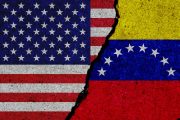According to Seymour Hersh, a journalist who has won the Pulitzer Prize, President Donald Trump ordered the bombing of Syria in April, despite having no evidence that the Bashar al-Assad government had used chemical weapons in the Syrian Civil War. In fact, Hersh contends that Trump ignored evidence to the contrary when he used 59 Tomahawk missiles to bomb Syria in retaliation against the Assad regime.
“None of this makes any sense,” Hersh reported one U.S. officer saying upon hearing of the planned bombing raid on Syria. “We KNOW that there was no chemical attack.… Claiming we have the real intel and know the truth … I guess it didn’t matter whether we elected Clinton or Trump,” the officer lamented. (Emphasis in the original).
It is reminiscent of the joke told after the 1964 presidential election between President Lyndon Johnson and Senator Barry Goldwater. “Well, they told me,” the joke went, “if I voted for Johnson, we’d be in a full-scale war in Vietnam … sure enough, I voted for Goldwater, and we are in a full-scale war in Vietnam.”
Hersh’s most famous journalistic achievement was his uncovering of the My Lai Massacre and its subsequent coverup that occurred during that war. It seems noteworthy that despite Hersh’s credentials, his latest story about Trump’s missile assault upon Syria, had to be placed in a German newspaper, Die Welt.
Hersh interviewed multiple U.S. advisers, examining the evidence that they provided, and concluded that the so-called chemical attack committed by the Syrian Air Force was really a non-chemical attack upon Khan Sheikhoun, targeting high-ranking jihadist leaders, using a 500-pound conventional bomb provided by the Russians. The place bombed was a two-story building that housed a grocery and other businesses on the ground floor. According to Hersh’s sources, the basement stored rockets, weapons, and ammunition. In addition, medicines and chlorine-based decontaminants were also stored there. The chlorine was used to cleanse bodies of the dead before burial.
“The rebels control the population by controlling the distribution of goods that people need to live — food, water, cooking oil, propane gas, fertilizers for growing their crops, and insecticides to protect the crops,” Hersh said he was told by a senior advisor in the American intelligence community.
In other words, it was an obvious target for a conventional bomb. Use of Sarin gas upon such a facility would be illogical.
Another advisor told Hersh, “This was not a chemical weapons strike. That’s a fairy tale. If so, everyone involved in transferring, loading and arming the weapon — you’ve got to make it appear like a regular 500-pound conventional bomb — would be wearing Hazmut protective clothing in case of a leak. There would be little chance of survival without such gear. Military grade sarin includes additives designed to increase toxicity and lethality. Every batch that comes out is maximized for death. That is why it is made. It is odorless and invisible and death can come within a minute.”
Victims at hospitals “smelled of bleach, suggesting that they had been exposed to chlorine,” Hersh was told. He noted that there was evidence that there was more than one chemical responsible for the various symptoms observed, “which would not have been the case if the Syrian Air Force — as opposition activists insisted — had dropped a sarin bomb, which has no percussive or ignition power to trigger secondary explosions. The range of symptoms is, however, consistent with the release of a mixture of chemicals, including chlorine and the organophosphates used in many fertilizers, which can cause neurotoxic effects similar to those of sarin.”
The media, however, was quick to assign blame to Assad. For whatever reason, so did President Trump. Trump’s UN ambassador, Nikki Haley, accused Russia at the United Nations of being complicit in a chemical weapons attack. “How many more children have to die before Russia cares?” she asked. Haley tied the attack directly to Assad: “We know that yesterday’s attack was a new low even for the barbaric Assad regime.”
Hersh cited an advisor who said that blaming Assad, without any evidence, was illogical. “Russia’s strategy against ISIS,” the advisor told Hersh, “which involves getting American cooperation, would have been destroyed.… Bashar would do that? When he’s on the verge of winning the war? Are you kidding me?”
Trump, however, apparently believed Assad did use sarin gas, against all logic, and with no evidence. “When you kill innocent children, innocent babies — babies, little babies — with a chemical gas that is so lethal … that crosses many, many lines, beyond a red line.… That attack on children yesterday had a big impact on me. Big impact.… It’s very, very possible … that my attitude toward Syria and Assad had changed very much.”
Trump’s previous noninterventionist attitude, in general, and with the Syrian Civil War in specific, was a huge (to use an often-used Trump word) reason that he was able to win the Republican presidential nomination, and finally, the general election. He rightly condemned President Barack Obama in 2013, Tweeting, “What will we get for bombing Syria besides more debt and a possible long-term conflict?”
During the recent presidential campaign, Trump rightly challenged the tendency of recent presidents to intervene in the internal affairs of other sovereign nations, particularly decrying the “regime change” agendas of Presidents Bush (both of them), Clinton, and Obama. Yet Trump seems to be going down the same path.
Eric Trump, son of the president, claims it was his sister Ivanka who swung their father over to launching a bombing raid in Syria, in response to the alleged use of chemical weapons. The younger Trump explained why: “Ivanka is the mother of three kids and she has influence. I’m sure she said, ‘Listen, this is horrible stuff.’”
Admitting that his father was opposed to taking any action in Syria before entering the White House, Eric said, “Then a leader gasses his own people, women and children. At some point America is a global leader and the world’s superpower has to come forward and act and they did with a lot of support from our allies and I think that’s a great thing.” (Emphasis added). Sadly, it was thought that Trump was opposed to such globalist initiatives.
Eric offered another “positive” result of the bombing of Syria, arguing that it provided proof that his father and his associates did not work in concert with Russia to hurt the Clinton campaign last year. “If there was anything that [the strike on] Syria did, it was to validate the fact that there is no Russia tie.”
Bombing another country seems to be a rather extreme way to make that point.
Whatever Trump’s motivation was for his 180-degree flip, it certainly pleased many who had opposed him in the recent past. Brian Williams of MSNBC called the bombing of Syria “beautiful.” Prominent neoconservatives such as John McCain, Lindsey Graham, and Bill Kristol praised Trump’s action. “I think Donald Trump became president of the United States,” Fareed Zakaria said on CNN. Several other interventionists said the same thing. The New York Times, Washington Post, and the Wall Street Journal all ran laudatory editorials.
Even Trump’s opponent in the 2016 race, Hillary Clinton, weighed in with her support. Her only complaint was that Trump should do even more. “I still believe we should have done a no-fly zone,” Clinton said. “We should have been more willing to confront Assad. Assad has an air force, and that air force is the cause of most of these civilian deaths that we have seen over the years.”
But paleo-conservative noninterventionists who had backed Trump in last year’s presidential race took a contrary view. Ann Coulter lamented, “We may have just as well had Jeb [Bush],” adding, “No president’s meddling in the Middle East has ever turned out well. Have we learned nothing from Iraq?”
Pat Buchanan, among the chief heroes of noninterventionism, was blunt. “Trump’s attack was unconstitutional.”
Coulter and Buchanan cited two reasons that Trump’s bombing of Syria was wrong. It is impractical — Russian Foreign Minister Sergei Lavrov said in response to calls for war against Syria so as to remove Assad, “Saddam Hussein, hanged. Is Iraq a better place, a safer place? Gadhafi murdered … Is Libya a better place? Now we are demonizing Assad. Can we draw lessons?” Senator Rand Paul (R-Ky.) voiced similar views. “I don’t want to support people who hate our country. I don’t want to support people who say when they’re done with Assad they are going to attack Israel and not ISIS [as Assad is doing].” And, as Buchanan noted, launching an attack upon Syria without a congressional declaration of war is unconstitutional.
It is also unprincipled. Syria has not attacked America and is no threat to attack America. What right does our government have to invade a sovereign foreign power?
Unfortunately, the unprovoked attack upon Syria of April may not be the end of it. Just today the Defense Department said it has detected “active preparations” by Syria for a chemical weapons attack, only hours after the White House had issued a statement that the Syrian government would “pay a heavy price” if it carried out another chemical weapons attack.
Of course, to carry out another such attack, it would mean that they had carried out one in April, which Hersh’s investigation concluded had not happened. It would not be the first time that the American public has been whipped up to support war. One only needs to read the false claims that Germany was killing babies and cutting off women’s breasts in Belgium in the early days of World War I. Or that the North Vietnamese had attacked an American ship in the Gulf of Tonkin. Or Saddam Hussein had massive stockpiles of WMDs that he was poised to use on America.
In 1916, Woodrow Wilson was reelected on the slogan, “He kept us out of war,” but he asked for a declaration of war shortly after the election. In 1964, Lyndon Johnson campaigned as a peace candidate, accusing his opponent Barry Goldwater as being a warmonger. In 2000, George W. Bush condemned Bill Clinton’s interventionist foreign policy, claiming he would have a “more humble” foreign policy.
Millions of Americans had hoped that Donald Trump would be different.
Photo of a cruise missile being fired: U.S. Navy




